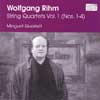Rihm String Quartets Vol 1
The first volume of the complete Rihmstring quartets, with the early works given strongly imaged performances
View record and artist detailsRecord and Artist Details
Composer or Director: Wolfgang Rihm
Genre:
Chamber
Label: Col legno
Magazine Review Date: 3/2004
Media Format: CD or Download
Media Runtime: 63
Mastering:
Stereo
DDD
Catalogue Number: WWE1CD20211

Tracks:
| Composition | Artist Credit |
|---|---|
| String Quartet No. 1 |
Wolfgang Rihm, Composer
Minguet Quartett Wolfgang Rihm, Composer |
| String Quartet No. 2 |
Wolfgang Rihm, Composer
Minguet Quartett Wolfgang Rihm, Composer |
| String Quartet No. 3, `Im Innersten' |
Wolfgang Rihm, Composer
Minguet Quartett Wolfgang Rihm, Composer |
| String Quartet No. 4 |
Wolfgang Rihm, Composer
Minguet Quartett Wolfgang Rihm, Composer |
Author: Fabrice Fitch
‘Isn’t writing string quartets today anachron-istic?’, asks the writer of the booklet-notes accompanying this CD. Well no, it’s not. You don’t have to share Wolfgang Rihm’s aesthetic viewpoint to observe just how many of today’s composers continue to find the medium endlessly absorbing, or to marvel at its own capacity for renewal. At the last count Rihm has written 12, and the Minguet Quartet has set itself the challenge (with the composer’s blessing) of recording them all.
This CD covers the first four, all written in the 1970s (though the fourth was completed in 1981). A sign of Rihm’s precociousness is the fact that first two (labelled ‘Op 2’ and ‘Op 10’, respectively) date from 1970, when the composer was still in his teens. They are both in what one might call a neo-expressionist style, and come across as quite slight, for all their earnestness. A more confident voice is heard in the third quartet, subtitled Im Innersten, in which passages of neo-Romantic string-writing intervene alongside shrill, modernist clichés. I use this last word advisedly, for Rihm deliberately plays and flirts with this concept – so deliberately that one feels at times like a bystander in a game of ‘chicken’. The shock tactics are clearly intentional, and they work to the extent that sceptics like me soon get incredibly irritated. Both Im Innersten and Quartet No 4 encapsulate Rihm’s early work, but the passage of time has not made them any less problematic.
But if so much of the music got me hopping mad, the Minguet Quartet deserve credit for their eloquence in its defence. They believe passionately in these pieces, and call upon a full expressive range, from the ‘earnestness’ of Expressionism, through the ‘sentiment’ of the tonal passages to the purposely ‘ugly’ sounds that fall into the category of extended string techniques. Their tone is warmer than the Ardittis, which allows Rihm’s ‘virtual quotations’ of the Romantic idiom (including, yes, a Tristan chord in the Third Quartet) to sound more ‘authentic’ (or ‘authentically’, depending on your point of view: all these phrases need quotation-marks around them). Rihm has found ideal interpreters, and however the music strikes you (and whatever else, it will strike you), the cycle begun here promises very well.
This CD covers the first four, all written in the 1970s (though the fourth was completed in 1981). A sign of Rihm’s precociousness is the fact that first two (labelled ‘Op 2’ and ‘Op 10’, respectively) date from 1970, when the composer was still in his teens. They are both in what one might call a neo-expressionist style, and come across as quite slight, for all their earnestness. A more confident voice is heard in the third quartet, subtitled Im Innersten, in which passages of neo-Romantic string-writing intervene alongside shrill, modernist clichés. I use this last word advisedly, for Rihm deliberately plays and flirts with this concept – so deliberately that one feels at times like a bystander in a game of ‘chicken’. The shock tactics are clearly intentional, and they work to the extent that sceptics like me soon get incredibly irritated. Both Im Innersten and Quartet No 4 encapsulate Rihm’s early work, but the passage of time has not made them any less problematic.
But if so much of the music got me hopping mad, the Minguet Quartet deserve credit for their eloquence in its defence. They believe passionately in these pieces, and call upon a full expressive range, from the ‘earnestness’ of Expressionism, through the ‘sentiment’ of the tonal passages to the purposely ‘ugly’ sounds that fall into the category of extended string techniques. Their tone is warmer than the Ardittis, which allows Rihm’s ‘virtual quotations’ of the Romantic idiom (including, yes, a Tristan chord in the Third Quartet) to sound more ‘authentic’ (or ‘authentically’, depending on your point of view: all these phrases need quotation-marks around them). Rihm has found ideal interpreters, and however the music strikes you (and whatever else, it will strike you), the cycle begun here promises very well.
Discover the world's largest classical music catalogue with Presto Music.

Gramophone Digital Club
- Digital Edition
- Digital Archive
- Reviews Database
- Full website access
From £8.75 / month
Subscribe
Gramophone Full Club
- Print Edition
- Digital Edition
- Digital Archive
- Reviews Database
- Full website access
From £11.00 / month
Subscribe
If you are a library, university or other organisation that would be interested in an institutional subscription to Gramophone please click here for further information.




